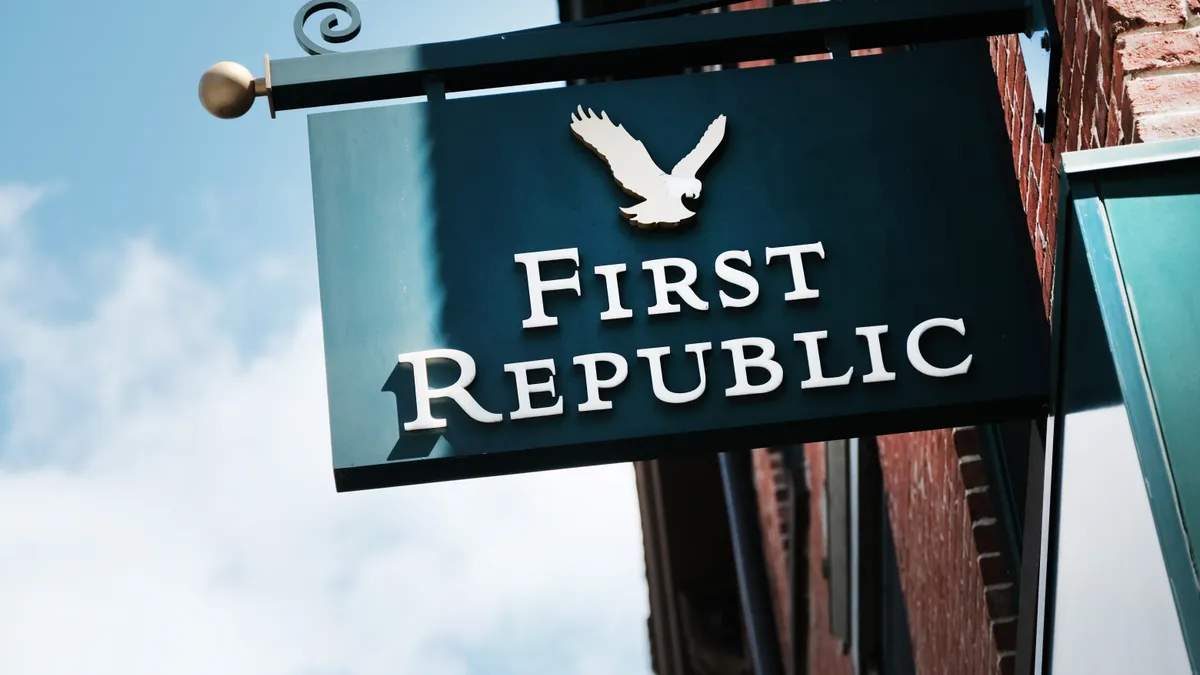Dive Brief:
- JPMorgan will “fight hard” to retain First Republic clients, JPMorgan Chase CFO Jeremy Barnum said Monday, a promise which comes as questions regarding the health of the banking sector have once again flared up following the latest large-scale bank collapse in as many months.
- Barnum, together with JPMorgan Chase CEO Jamie Dimon, addressed investors during a conference call after the bank announced that it had agreed to acquire the “substantial majority” of First Republic’s assets as well as assuming its deposits from the Federal Deposit Insurance Corporation (FDIC).
- The bank is taking steps to remain conservative regarding the potential impact of the deal, Barnum said, noting that “obviously, there are open questions about deposit retention.”
Dive Insight:
San Francisco, California-based First Republic was closed by the California Department of Financial Protection and Innovation and the FDIC appointed as receiver, with JPMorgan agreeing to assume its assets, the FDIC said in a release. “The resolution of First Republic Bank involved a highly competitive bidding process,” the FDIC noted.
Marianne Lake and Jennifer Piepszak, co-CEOs for JPMorgan Chase consumer and community banking, will oversee the acquired First Republic businesses, the bank said in a Monday press release regarding the transaction.
It is not clear whether First Republic executives including CFO Neal Holland and CEO Michael Roffler have retained their titles or remain active.
While the speed of the transaction happened “relatively quickly and this is “not the outcome that we necessarily planned for or expected,” Barnum said, the transaction does represent opportunities for JPMorgan.
“The branches we are acquiring from First Republic are in attractive locations and affluent markets, which is an opportunity to accelerate our wealth strategy,” Barnum said during the investor call.
JPMorgan will assume approximately $173 billion of loans and $30 billion of securities, as well as the assumption of approximately $92 billion of deposits, the bank said. It will pay $10.5 billion to the FDIC, which will continue to insure deposits.
The estimated cost of the deal to the Deposit Insurance Fund will be about $13 billion, the FDIC said.
“Our government invited us and others to step up, and we did,” said Dimon in a statement included in the bank’s announcement. “Our financial strength, capabilities and business model allowed us to develop a bid to execute the transaction in a way to minimize costs to the Deposit Insurance Fund.”
First Republic bank’s collapse once again raises questions about the health of the banking industry, especially that of regional banks, as it represents the second-largest bank failure in U.S. history. It comes on the heels of the high-profile collapse of financial institutions Silicon Valley Bank and Signature Bank in March.
First Republic saw a steep drop in deposits in March, dropping 35.5% year-over-year to reach $104.5 billion, the bank reported last week during its first quarter 2023 earnings results.
The drop came even after 11 banks, including JPMorgan, funneled $30 billion in uninsured deposits into First Republic earlier in March in a bid to keep the regional lender from failing, Industry Dive sister publication Banking Dive previously reported. JPMorgan, together with Bank of America, Citibank and Wells Fargo, contributed $5 billion to the effort to stabilize First Republic.
Though First Republic’s seizure represents the third bank failure in an approximately two-month period, the banking system is “very stable,” CEO Jamie Dimon said Monday in response to questions regarding if the industry’s liquidity issues are coming to a close.
While he highlighted some key areas ripe for change in the banking industry, it is important to be “very, very thoughtful” about such changes and do so intelligently, because “what you want to do is have a healthier, strong and competitive regional bank and community bank system,” Dimon said.
JPMorgan Chase declined to comment past the details included in its release and investor call.












